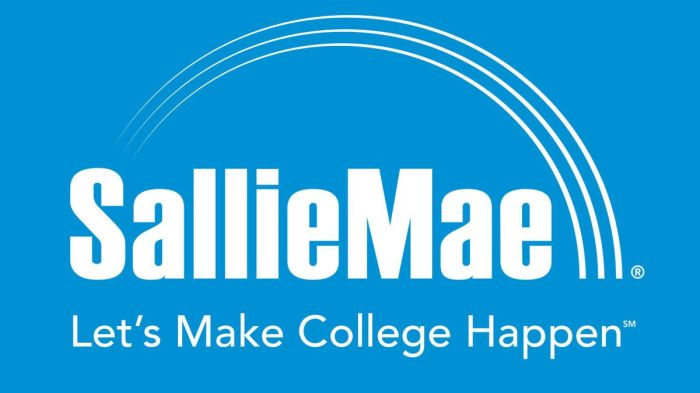
Understanding how your Sallie Mae student loans affect your credit score is crucial for long-term financial health. This guide delves into the relationship between Sallie Mae repayment history and credit reports, exploring how various repayment strategies influence your creditworthiness. We’ll examine the reporting process, address common misconceptions, and provide actionable strategies for improving your credit score while managing your Sallie Mae loans effectively.
From negotiating better repayment terms to understanding the impact of on-time payments, we’ll equip you with the knowledge and tools necessary to navigate the complexities of student loan repayment and build a strong credit profile. This involves a comprehensive look at how Sallie Mae’s reporting practices compare to other lenders and the long-term consequences of responsible (or irresponsible) loan management.
Sallie Mae’s Impact on Credit Scores

Sallie Mae, a major student loan servicer, plays a significant role in shaping borrowers’ credit histories. Understanding how Sallie Mae reports your loan information to credit bureaus is crucial for maintaining a healthy credit score. Your repayment behavior directly impacts your creditworthiness, influencing your ability to secure loans, credit cards, and even rental agreements in the future.
Your repayment history with Sallie Mae is the primary factor affecting your credit score. Sallie Mae, like other major servicers, reports your loan activity to the three major credit bureaus (Equifax, Experian, and TransUnion) on a monthly basis. This reporting includes details about your loan balance, payment history, and any instances of delinquency or default.
Factors Considered by Sallie Mae in Credit Reporting
Sallie Mae considers several key factors when reporting your loan information. These include the consistency and timeliness of your payments, your overall loan balance, and whether you’ve experienced any missed or late payments. The length of your credit history with Sallie Mae also contributes to your credit score. A longer history of responsible repayment generally leads to a better credit score. Furthermore, any instances of default or serious delinquency will significantly negatively impact your score.
Impact of Different Repayment Methods on Credit Scores
On-time payments consistently demonstrate responsible financial behavior, leading to a positive impact on your credit score. Conversely, late payments, even by a few days, can negatively affect your score. Repeated late payments can further damage your credit. Defaulting on your loan—failing to make payments for an extended period—results in the most severe negative impact, potentially leading to collection activity and severely damaging your creditworthiness for years. For example, a borrower consistently making on-time payments for five years might see their credit score increase substantially, while a borrower who defaults on their loan could see their score plummet by hundreds of points.
Comparison of Sallie Mae’s Reporting Practices with Other Major Student Loan Servicers
Sallie Mae’s reporting practices are generally consistent with those of other major student loan servicers, such as Navient and Nelnet. All these servicers report loan information to the three major credit bureaus, and all consider similar factors when assessing a borrower’s creditworthiness. The key difference often lies in the specific details of their customer service and support for borrowers experiencing financial hardship, which can indirectly affect a borrower’s ability to make timely payments. While the core reporting mechanisms are similar, individual experiences might vary slightly based on the servicer’s internal processes and communication protocols.
Credit Score Improvement Strategies with Sallie Mae Loans
Managing student loans effectively, particularly those from Sallie Mae, is crucial for building a strong credit history. Consistent positive financial behavior directly impacts your credit score, which in turn influences your access to future financial opportunities, including lower interest rates on loans. This section details strategies for improving your credit score while responsibly managing your Sallie Mae student loans.
Step-by-Step Plan for Credit Score Improvement
Improving your credit score requires a multifaceted approach. This plan Artikels key steps to take while managing your Sallie Mae student loans. Consistent effort and discipline are key to seeing positive results.
- Understand Your Current Credit Report: Obtain a free copy of your credit report from AnnualCreditReport.com. Review it carefully for any errors or discrepancies. Dispute any inaccuracies immediately with the relevant credit bureaus.
- Prioritize On-Time Payments: This is the single most important factor affecting your credit score. Set up automatic payments to ensure you never miss a payment on your Sallie Mae loans.
- Keep Credit Utilization Low: Avoid maxing out your credit cards. Aim to keep your credit utilization ratio (the amount of credit you use compared to your total available credit) below 30%. This demonstrates responsible credit management.
- Maintain a Diverse Credit Mix: While student loans are a significant part of your credit history, consider adding other forms of credit, such as a credit card used responsibly, to diversify your credit profile. This can show lenders you can manage different types of credit.
- Monitor Your Credit Score Regularly: Track your progress by checking your credit score periodically. This allows you to identify areas for improvement and measure the effectiveness of your strategies.
Negotiating Better Repayment Terms with Sallie Mae
Negotiating more favorable repayment terms with Sallie Mae can positively impact your credit score indirectly. Lower monthly payments can ease financial strain, reducing the risk of missed payments. However, remember that extending the repayment period generally increases the total interest paid.
Negotiation strategies include exploring income-driven repayment plans, which adjust your monthly payments based on your income. You might also inquire about deferment or forbearance options if facing temporary financial hardship. Remember to carefully consider the long-term implications of any changes to your repayment plan. Always document any agreements reached with Sallie Mae in writing.
Benefits of On-Time Payments and Consistent Positive Credit Behavior
The consistent demonstration of responsible credit behavior, especially on-time payments, is crucial for a healthy credit score. On-time payments significantly improve your credit score and reduce the risk of defaulting on your loan. A higher credit score translates to better interest rates on future loans, lower insurance premiums, and potentially better rental terms.
Consistent positive credit behavior builds trust with lenders, signifying your reliability as a borrower. This history of responsible financial management will positively impact your credit score over time, opening doors to more favorable financial opportunities.
Impact of Credit Score Ranges on Sallie Mae Loan Interest Rates
The interest rate you receive on your Sallie Mae loan is directly influenced by your credit score. A higher credit score generally results in a lower interest rate, saving you money over the life of the loan.
| Loan Interest Rate Range | Credit Score Range |
|---|---|
| 7-9% | 750-850 (Excellent) |
| 9-11% | 700-749 (Good) |
| 11-14% | 650-699 (Fair) |
| 14%+ | Below 650 (Poor) |
Understanding Sallie Mae’s Reporting Process

Sallie Mae, as a major student loan servicer, plays a significant role in shaping your credit history. Understanding how they report your loan information to credit bureaus is crucial for maintaining a healthy credit score. This section details the key aspects of Sallie Mae’s reporting process, including what information is shared, the timeline for updates, and how to address any inaccuracies.
Sallie Mae reports key elements of your student loan account to the three major credit bureaus (Equifax, Experian, and TransUnion). This includes your account balance, payment history (on-time or late payments), loan status (current, delinquent, paid in full), and the total credit limit (your loan amount). The accuracy of this information directly impacts your credit score, so it’s essential to keep a close eye on your reports.
Key Elements Reported to Credit Bureaus
Sallie Mae reports several key data points to credit bureaus which influence your credit score. These include the account opening date, current balance, payment history (including any missed or late payments), loan status (whether the loan is current, in deferment, forbearance, or default), and the total credit limit (the original loan amount). Consistent on-time payments are positively reflected, while late or missed payments can negatively impact your credit score. The loan status also significantly influences the credit report. For instance, a loan in default will have a severely negative impact.
Reporting Timeline to Credit Agencies
While Sallie Mae doesn’t publicly state an exact reporting timeframe, updates typically occur monthly. Changes in your loan status, such as a missed payment or a successful payment, are generally reflected on your credit report within 30-60 days. However, it’s important to note that there can be slight variations depending on the credit bureau and the specific circumstances. Regularly checking your credit reports from all three bureaus is advisable to ensure accuracy and timeliness.
Correcting Inaccuracies in Sallie Mae’s Reporting
Discovering inaccuracies on your credit report is a serious matter. If you identify incorrect information reported by Sallie Mae, prompt action is essential. Begin by gathering all relevant documentation, such as loan agreements, payment confirmations, and any communication you’ve had with Sallie Mae. This documentation will support your claim.
Disputing Incorrect Information Reported by Sallie Mae
To dispute incorrect information, you should first contact Sallie Mae directly through their official channels. This usually involves submitting a written dispute through their website or by mail. Clearly state the specific inaccuracies you’ve identified, providing supporting documentation to substantiate your claims. Keep records of all communication with Sallie Mae. If Sallie Mae doesn’t resolve the issue, you can then file a dispute directly with the credit bureaus involved. Each bureau has a specific process for handling disputes, usually involving completing an online form or sending a written letter. The bureau will then investigate the discrepancy and contact Sallie Mae to verify the information. This process can take several weeks or even months to complete. Persistence and meticulous record-keeping are vital throughout this process.
The Role of Student Loans in Overall Credit Health

Student loans, while essential for many pursuing higher education, significantly impact long-term credit health. Responsible management of these loans can build a strong credit history, while mismanagement can lead to severe financial consequences. Understanding the nuances of federal versus private loans, and the reporting processes involved, is crucial for navigating this critical financial stage.
Student loan repayment directly influences credit scores. Consistent on-time payments demonstrate creditworthiness to lenders, gradually increasing your credit score. Conversely, late or missed payments negatively affect your score, potentially impacting future borrowing opportunities. The length of your repayment history also matters; a longer history of responsible repayment generally translates to a better credit score. This positive impact extends beyond just the score itself; a good credit history can lead to lower interest rates on future loans, better terms on credit cards, and even improved chances of securing favorable rental agreements.
Federal vs. Private Student Loan Impact on Credit Scores
Federal and private student loans are reported to credit bureaus differently, impacting credit scores in distinct ways. Federal loans, generally managed by the government, often have more lenient repayment options and may offer more forgiving approaches to missed payments in certain circumstances. Private loans, on the other hand, are subject to the lending institution’s specific policies, which can vary significantly. These differences can affect how negative marks appear on your credit report and influence the overall impact on your credit score. For instance, a missed payment on a private loan might have a more immediate and severe impact compared to a similar event on a federal loan. The reporting differences are mainly due to the differing levels of regulatory oversight and the variety of available repayment plans.
Successfully Managing Sallie Mae Loans to Build Credit
Successfully managing Sallie Mae loans, a major private student loan provider, directly contributes to positive credit building. Consistent on-time payments, even small amounts, are recorded and reported to credit bureaus, building a positive payment history. Proactive communication with Sallie Mae regarding any potential financial difficulties can prevent late payments and associated negative impacts on credit scores. Exploring options like income-driven repayment plans, if eligible, can help maintain consistent payments, even during periods of financial instability. For example, a borrower who consistently pays their Sallie Mae loan on time for three years would see a positive impact on their credit score, improving their creditworthiness and potentially leading to better financial opportunities.
Consequences of Defaulting on Sallie Mae Student Loans
Defaulting on Sallie Mae student loans has severe consequences for credit scores and future financial opportunities. A default is reported to credit bureaus, significantly lowering credit scores and making it difficult to obtain future loans, credit cards, or even rent an apartment. Furthermore, wage garnishment, tax refund offset, and difficulty securing employment are all potential consequences of loan default. For example, a default on a $30,000 Sallie Mae loan could result in a significant drop in credit score, potentially preventing the borrower from buying a house or securing a car loan for several years. The long-term financial ramifications of defaulting can be substantial and far-reaching, impacting nearly every aspect of financial life.
Resources and Support for Managing Student Loan Debt
Effectively managing your Sallie Mae student loans requires understanding the available resources and support systems. This section Artikels the tools and assistance provided to borrowers to navigate repayment and improve their credit standing. Proactive engagement with these resources can significantly impact your financial well-being.
Sallie Mae’s Resources for Borrowers
Sallie Mae offers a variety of resources designed to help borrowers manage their student loan debt effectively. These resources aim to simplify the repayment process and provide guidance on financial planning. They include online account access for viewing statements and making payments, educational materials on repayment options, and personalized guidance through customer service channels. For example, their website features calculators to estimate monthly payments under different repayment plans, and their customer service representatives can answer questions about loan terms and available options. Furthermore, Sallie Mae often provides webinars and workshops focusing on financial literacy and debt management strategies.
Support from Sallie Mae for Credit Score Improvement
Sallie Mae’s support extends to helping borrowers improve their credit scores. While they don’t directly offer credit repair services, their resources contribute indirectly to improved credit health. On-time payments, a key factor in credit scoring, are facilitated by the various payment options offered by Sallie Mae. Moreover, the educational materials provided by Sallie Mae on responsible financial management equip borrowers with the knowledge to make informed decisions that positively impact their credit. For instance, understanding the importance of consistent on-time payments and avoiding missed payments is crucial for building a good credit history.
Seeking Professional Financial Advice
Seeking professional financial advice is a valuable step for borrowers struggling with student loan repayment or seeking to improve their credit scores. A certified financial planner (CFP) or credit counselor can provide personalized guidance tailored to individual circumstances. The process typically begins with a consultation to assess your financial situation, including your income, expenses, and debt levels. Following the assessment, a personalized plan is developed, outlining strategies for repayment and credit improvement. This plan might involve exploring different repayment options, budgeting techniques, or debt consolidation strategies. The ongoing support provided by these professionals can be invaluable in achieving long-term financial stability.
Common Misconceptions about Student Loans and Credit Scores
Understanding the realities of student loans and their impact on credit scores is crucial for responsible financial management. Several common misconceptions can hinder effective debt management and credit building.
- Myth: Student loans don’t affect my credit score. Reality: On-time payments of student loans are reported to credit bureaus and significantly impact your credit score.
- Myth: Defaulting on student loans is a minor issue. Reality: Defaulting has severe consequences, including damage to credit score, wage garnishment, and tax refund offset.
- Myth: I can’t improve my credit score with student loans. Reality: Consistent on-time payments of student loans demonstrate responsible credit behavior and contribute positively to credit score improvement.
- Myth: Only high balances negatively impact my credit. Reality: Consistent on-time payments are more important than the loan balance in determining your creditworthiness.
Outcome Summary
Successfully managing your Sallie Mae student loans is a significant step towards building a positive credit history. By understanding how your repayment habits affect your credit score and utilizing the resources available, you can establish a solid financial foundation for the future. Remember, proactive management and responsible financial behavior can significantly impact your creditworthiness and open doors to various financial opportunities. Take control of your financial future, one responsible payment at a time.
Common Queries
What happens if I miss a Sallie Mae payment?
Missing a payment will negatively impact your credit score and may result in late fees. Consistent late payments can lead to more serious consequences, including loan default.
Does Sallie Mae report to all three credit bureaus?
Yes, Sallie Mae typically reports to all three major credit bureaus: Equifax, Experian, and TransUnion.
How long does negative information stay on my credit report?
Negative information, such as late payments, generally remains on your credit report for seven years from the date of the incident.
Can I get my Sallie Mae loan information removed from my credit report?
No, unless there’s an error in the reporting, accurate loan information cannot be removed. However, positive repayment behavior over time will help mitigate the negative impact of past issues.
